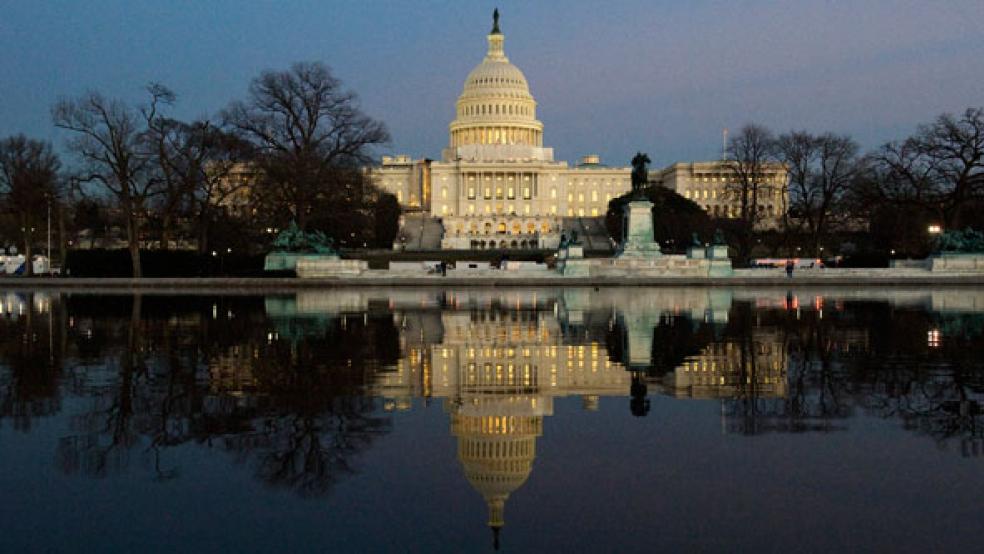Perhaps it’s a mark of diminished expectations of the federal government’s ability to get things done, or just a concession to the reality that the country’s fiscal problems are simply too large to be addressed in a single stroke. Whatever it is, one of the most vocal proponents of the sort of “grand bargain” policies floated in the early years of the Obama presidency has trimmed its sails, laying out the parameters of a “mini-bargain” that it hopes lawmakers might find achievable.
The Committee for a Responsible Federal Budget, which has long pushed for sustainable spending and debt management, this week released a set of proposals that, while falling short of the massive changes to the tax code and entitlement spending that former president Barack Obama and former House Speaker John Boehner once contemplated, would at least begin moving the country in that direction.
Related: The Looming Fiscal Train Wreck Means Trump Won’t Get His Wall. Here’s Why
“Unfortunately, policymakers are far from negotiating a ‘grand bargain’ to fix the debt,” CRFB concedes in the paper released Thursday. “Instead, many are pursuing policies that would further increase debt by cutting taxes under the guise of tax reform and increasing defense and non-defense discretionary spending above current law caps.
“To refocus efforts in the right direction, America needs a ‘mini-bargain’ on the budget. That bargain should put in place measures to prevent unpaid-for tax cuts and spending increases, make a down payment on debt reduction, and establish a process for further reforms down the road.”
Current co-chairs of the organization -- Purdue University President and former Indiana Gov. Mitch Daniels and Leon Panetta, who has served in multiple high-ranking positions in Washington, including Secretary of Defense, CIA Director, and White House Chief of Staff -- made a joint statement about the proposal to The Hill newspaper.
“Major tax and spending reforms are needed to fix the country’s debt, but we can’t let the perfect be the enemy of the good,” said Panetta, calling for lawmakers to take positive steps rather than waiting to address the problem in a major piece of legislation that may never come.
Related: Trump May Be in a Legislative Slump, but His Energy Agenda Is Getting Lots of Hits
“No plan that omits major reforms of Medicare, Medicaid and Social Security will protect the nation’s economic future or avoid inflicting an immoral burden on younger Americans,” said Daniels. He added, “But while we await the statesmanship that delivers those reforms, we should take every partial step possible, and this proposal offers an achievable down payment on the changes that will eventually be necessary.”
The six-part program begins with the elimination of the budget sequester put in place in 2011 to force Congress into making a deal that lawmakers were never able to consummate. It requires dramatic cuts to spending on defense and non-defense discretionary programs that Congress has been attempting to avoid through various gimmicks ever since imposing them on itself.
CRFB recommends replacing the sequester with legislative budget caps, and offsetting the extra spending with savings from a change to the way inflation is measured. The change, to what’s known as chained-CPI, is widely seen as a more accurate measure of real inflation, and would reduce federal outlays from mandatory spending that is tied to inflation measures.
Related: Why Raising the Debt Ceiling Won’t Be a Problem This Year
The plan would also seek to wrest federal policymaking back into pay-as-you-go territory, requiring new spending proposals to be offsets by cuts elsewhere or increases in revenue. The organization believes that a return to PAYGO rules would strengthen the possibility of meaningful tax reform, which could in turn generate $400 billion in increased revenue over a decade.
Other elements of the proposal include the adoption of savings in mandatory spending programs, including Medicare and Medicaid. The report claims that substantial savings are available in those programs that could be achieved without reducing the amount or quality of care they deliver.
The plan also calls for a commission to reform the Social Security system, in hopes of avoiding a benefits cut that could be needed to maintain solvency after 2034.
Finally, the CRFB calls on Congress to raise the debt ceiling as necessary, to avoid a costly and unnecessary self-inflicted financial crisis, and to enact reforms to the federal budget process designed to “increase transparency, improve accountability, and focus on the long term.”
“The current fiscal situation is unsustainable, and policymakers should address it sooner rather than later,” the report concludes. “Ultimately, the country needs a major budget deal to reduce spending, secure entitlement programs, raise new revenue, and promote economic growth. Without such efforts, debt will remain on its current harrowing trajectory.”





